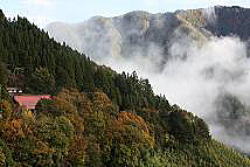
In olden times, when the gods used to live in the Mitsumine area, there was a secret place where Tengu, a legendary creature found in Japanese tradition, was said to live.
Bukkokukokushi, who opened this temple, was born in Kyoto as Emperor Gosaga's third son. At that time there were intense political struggles in Kyoto involving the imperial court as the Kamakura government was losing power.
Bukkokukokushi, who entered the Buddhist world at the age of 16 to avoid
such conflicts, was seeking a place for training in peace in the eastern
area, and at last he arrived in this valley where it was said that even
the beast would not come.
Here he found a world completely unrelated to the fierce political feuds that was taking place in Kyoto and Kamakura.
A clear stream sound in the distance. Trees sprouting through the harsh
winter. A sky full of stars whose time and space was completely distant from human's concept of time.
The wheel of nature turns with dignity despise not being noticed by men.
Here, he must have found a scene that seemed to have never entered the human world.
As he kept meditating in silence, he must have looked like a Tengu to the bandits and hunters passing by.
As years went by and the Edo period started, the belief in the power of mountains and of the temples and shrines that were in them became popular. As a result, the valley where people had feared a Tengu lived, prospered in a wave of unprecedented popularity.
The voice of the valley is the voice of Buddha.
The wilderness that spreads in front of me looks like a Buddha.
Bukkokukokushi’s words revert to the 21st century now.
 神々の里、三峰のさらにその奥に、 神々の里、三峰のさらにその奥に、
天狗が住むといわれた秘境があった
時代は鎌倉時代末期から南北朝時代にむかう動乱の世
当山開山仏国国師は後嵯峨天皇の第三皇子として京の都に生をうけられた。
当時の京の都は鎌倉幕府の無力化とともに朝廷を巻き込んだ政権争いが
にわかに激しさを増してきている時代であった。
そうした争いを避けるかのように16歳の時仏門に入った国師は、遥か東国に
修行の地を求め鎌倉建長寺にはいる。その後さらなる悟りの道を求めて獣も
寄り付かぬといわれたこの渓谷にたどりついた。
そこには、京の都や鎌倉を舞台にくりひろげられる激しい政権争いとは
全く無縁の世界がひろがっていた。
遠くには清流の音、厳しい冬を通り越して芽吹く木々、
それらが育む鳥たちのさえずり。
夜には満天の星たちが遥か数万光年の宇宙の時を刻む。
誰に見られる為でもなく淡々と、しかし威厳に満ちた大自然。
ここでは、人間の世界にいることさえ、忘れてしまいそうな光景が広がっていたに違いない。
黙々と座禅を続ける国師の姿は、山賊や猟師たちには天狗に映ったのだろうか。
その後、天狗が住むと恐れられた渓谷は江戸時代には空前の山岳信仰の波に乗り
繁栄することになる。
渓声即是黄長舌。山色豈非清浄心。
けいせいすなわちこれこうちょうぜつ
さんしょくあにしょうじょうしんあらざらんや
二十一世紀の今、国師の言葉は七百年の時代を超えてよみがえる。
|